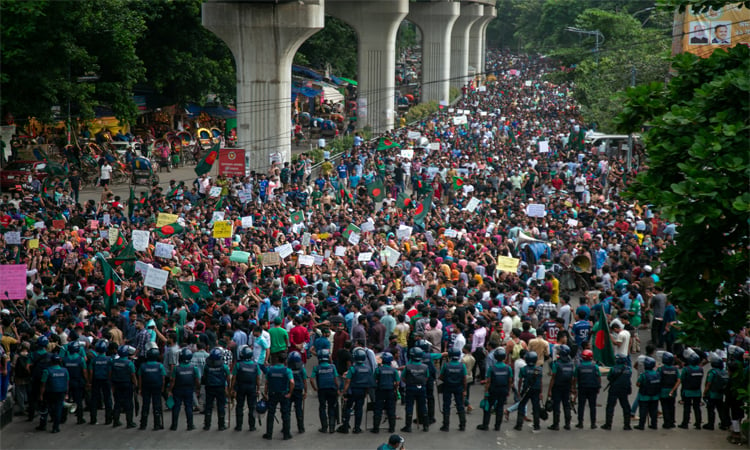News Flash

DHAKA, July 23, 2025 (BSS) - At least 1,400 people were detained across the country on July 24 last year as law enforcers continued a 'combing drive' in the name of arresting people over their involvement in violent activities during the quota reform movement.
According to a leading Bangla daily- Prothom Alo- at least 641 were detained from the capital alone on the day while most of them were identified as leaders and activists of BNP and Jamaat-e-Islami.
With the arrests on July 24, the total number of arrests across the country stood at least 4,500 since July 17. Of the total arrestees, 1,758 were from the capital and 703 from Chattogram.
Speaking about the mass arrest, the then Detective Branch (DB) chief Additional Commissioner Mohammad Harun-Ur-Rashid said, "We are identifying and arresting the perpetrators based on video footage."
That day, then Inspector General of Police (IGP) Chowdhury Abdullah Al-Mamun said that they would bring all perpetrators to justice. "Wherever the miscreants are hiding, they will be brought under the law," he stated.
However, amid the nationwide curfew in effect for the fifth consecutive day with partial relaxation, fresh clashes were reported in the capital and several other districts on a limited scale as a faction of the anti-discrimination student movement was carrying out public outreach camping wearing black clothes on their mouths.
In Dhaka and three other districts, the curfew was relaxed from 10am to 5pm on July 24 while other districts also witnessed curfew relaxation for a short period allowing the people to perform their emergency tasks.
Long-distance buses resumed services from Dhaka and launches from Sadarghat launch terminal.
Government offices and banks were permitted to open for four hours. Alongside the police and RAB, army personnel continued patrolling the streets to maintain law and order.
The then Home Minister Asaduzzaman Khan Kamal said the curfew would remain in effect until public confidence is fully restored.
The same day, three missing coordinators of the anti-discrimination student platform Asif Mahmud Shojib Bhuyain, Abu Baker Majumder and Rifat Rashid were released from secret detention after five days.
Asif Mahmud, in his book 'Janmobhumi Othoba Mrithyu', confirmed that he was detained in an 'Ayna Ghar (glass house)', a secret detention cell which appeared to be the worst symbol of Awami League's (AL) fascist regime.
According to media reports, as of the night of July 24, the death toll stood at least 201, with four new casualties, including a student of Chittagong University who succumbed to injuries while undergoing treatment.
Besides, the bodies of eight people killed during the movement remained unidentified, prompting Dhaka Medical College Hospital (DMCH) authorities to bury them as unclaimed bodies on July 24.
On the same day, the deposed Prime Minister Sheikh Hasina held a views exchange meeting with editors and senior journalists of different newspapers at her official Ganabhaban residence.
The anti-discrimination student movement leaders, however, issued an eight-point directive to the agitating students on the day.
Besides, the US State Department of Defense (Pentagon) made public comments regarding the developments in Bangladesh. Pentagon spokesperson Maj. Gen. Patrick S. Ryder said they were closely monitoring the situation and urged all parties to remain calm.
On the same day, the judicial inquiry commission earlier formed to investigate the deaths of six individuals on July 16 held its first meeting. The commission decided to issue a public notice seeking information on the violent incidents and visit the areas of incidents once the situation gets normalized.
That night, the Bangladesh Telecommunication Regulatory Commission (BTRC) restored broadband internet on a trial basis across the country, although mobile internet remained suspended.